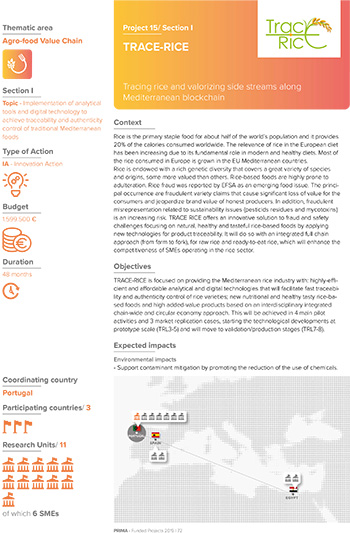About the Project
 Context
Context
Rice is the primary staple food for about half of the world's population and it provides 20% of the calories consumed worldwide. The relevance of rice in the European diet has been increasing due to its fundamental role in modern and healthy diets. Most of the rice consumed in Europe is grown in the EU Mediterranean countries.
Rice is endowed with a rich genetic diversity that covers a great variety of speciesand origins, some more valued than others. Rice-based foods are highly prone to adulteration. Rice fraud was reported by EFSA as an emerging food issue. The principal occurrence are fraudulent variety claims that cause significant loss of value for the consumers and jeopardize brand value of honest producers. ln addition, fraudulent misrepresentation related to sustainability issues (pesticids residues and mycotoxins) is an increasing risk.
TRACE RICE offers an innovative solution to fraud and safety challenges focusing on natural, healthy and tasteful rice-based foods by applying new technologies for product traceability. lt will do so with an integrated full chain approach (from farm to fork), for raw rice and ready-to-eat rice, which will enhance the competitiveness of SMEs operating in the rice sector.
Objectives
TRACE-RICE is focused on providing the Mediterranean rice industry with: highly-efficientand affordable analytical and digital technologies that will facilitate fast traceability and authenticity control of rice varieties; new nutritional and healthy tasty rice-based foods and high added-value products based on an interdisciplinary integrated chain-wide and circular economy approach. This will be achieved in 4 main pilot activities and 3 market replication cases, starting the technological developments at prototype scale (TRL3-5) and will move to validation/production stages (TRL7-8).
Expected impacts
Environmental impacts:
- Support contaminant mitigation by promoting the reduction of the use of chemicals.
- Reduce fossil fuels consumption by using blockchain technologies.
- Support the goals of the EU biodiversity strategy by the valorization and genetic characterisation of adapted varieties and integration of datasets in a network database.
Social impacts:
- Improve the quality of life of consumers by improving the rice quality control andoffering healthier and safer products by upholding quality standards.
- Obtain new high added value products and contribute to food diversity, promoting Mediterranean cultural heritage and boosting the circular economy.
- lncrease the confidence and producer-consumer engagement in Mediterranean foods, ensuring traceability and origin of rice varieties and reducing fraud and contamination.
Economic impacts
- Foster importance to the Mediterranean rice commercialization in international markets by the mitigation of rice fraud by the development of rice authenticity tools (DNA-based and predictive models using machine learning strategies).
- Adopt measures to reduce the extreme volatility of prices of rice based foods in themarket and facilitate timely access to information thanks to blockchain technologies.
- lntroduce new business model for a technologically stagnant sector.
- Improve the competiveness of local producers and SMEs by fostering interaction between scientific and entrepreneurial stakeholders.

